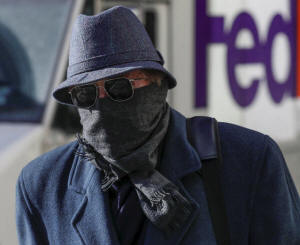|
U.S. East Coast to feel blast of arctic
air that chilled Midwest
 Send a link to a friend
Send a link to a friend
 [December 15, 2016]
(Reuters) - Residents of the East
Coast on Thursday will feel the blast of arctic air that has swept
across the U.S. Midwest this week and placed a large swath of the
country under a wind chill advisory, officials said. [December 15, 2016]
(Reuters) - Residents of the East
Coast on Thursday will feel the blast of arctic air that has swept
across the U.S. Midwest this week and placed a large swath of the
country under a wind chill advisory, officials said.
The arctic air began blowing south from Canada into the Midwest earlier
this week, prompting authorities to warn of the risk of frostbite and
hypothermia.
A woman whose body was found outside in St. Paul, Minnesota, on Monday
has been determined to have died of hypothermia, according to local
newspaper the Star Tribune, which cited the medical examiners' office.
The blast of arctic air will spread to the East Coast on Thursday, with
the National Weather Service forecasting temperatures in New York City
around 25 degrees Fahrenheit (minus 4 degrees Celsius).
"The coldest of the arctic air is just now arriving onto the East
Coast," meteorologist Patrick Burke of the Weather Prediction Center
said in a telephone interview.
As the region cools, temperatures might drop enough in Boston that on
Friday it could approach a record low, Burke said. Other areas along the
East Coast as far south as Norfolk, Virginia, will also be unusually
cold.

Connecticut Governor Dannel P. Malloy said in a statement he would
activate the state's severe cold weather protocol beginning on Thursday
evening, directing state officials to work with shelters to bring in
homeless people.
Cold temperatures in the Midwest were expected to persist on Thursday,
with certain areas from North Dakota to western Pennsylvania under wind
chill advisories, Burke said.
The heaviest snowfall in the nation on Thursday will be around the Great
Lakes in Michigan where up to 10 inches (25 cm) of snow was expected,
and in parts of the U.S. West where a storm is pushing inland from the
Pacific Coast, Burke said.
[to top of second column] |

A man bundled up against the chill makes his way along the Michigan
Avenue in Chicago, Illinois, U.S., December 13, 2016. REUTERS/Kamil
Krzaczynski

The Sierra Nevada mountain range in California and the mountains
around Yellowstone National Park in Wyoming could receive more than
two feet (61 cm) of snow, Burke said.
Rain is expected to douse other parts of the West on Thursday, which
has prompted the Weather Service to warn of potential flooding in
Northern California and Oregon.
When the storm slammed Portland, Oregon, with heavy snow on
Wednesday, it caused traffic accidents and forced the closure of
some streets and highways.
(Reporting by Alex Dobuzinskis in Los Angeles; Editing by Catherine
Evans)
[© 2016 Thomson Reuters. All rights
reserved.]
Copyright 2016 Reuters. All rights reserved. This material may not be published,
broadcast, rewritten or redistributed.
 |